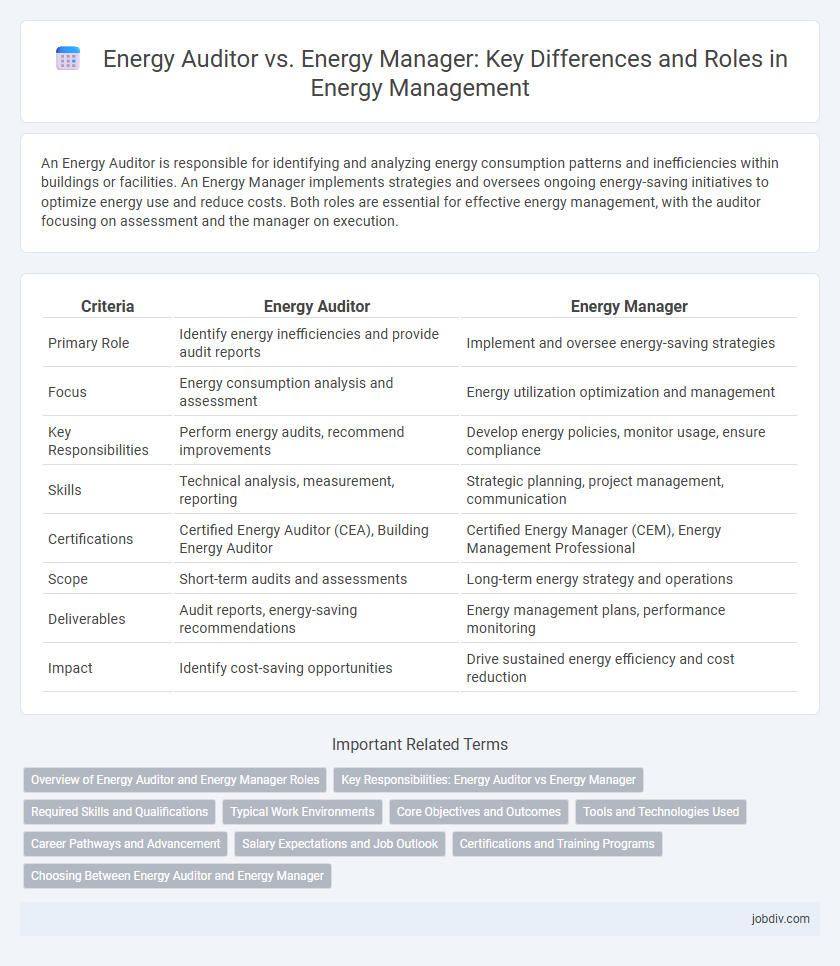An Energy Auditor is responsible for identifying and analyzing energy consumption patterns and inefficiencies within buildings or facilities. An Energy Manager implements strategies and oversees ongoing energy-saving initiatives to optimize energy use and reduce costs. Both roles are essential for effective energy management, with the auditor focusing on assessment and the manager on execution.
Table of Comparison
| Criteria | Energy Auditor | Energy Manager |
|---|---|---|
| Primary Role | Identify energy inefficiencies and provide audit reports | Implement and oversee energy-saving strategies |
| Focus | Energy consumption analysis and assessment | Energy utilization optimization and management |
| Key Responsibilities | Perform energy audits, recommend improvements | Develop energy policies, monitor usage, ensure compliance |
| Skills | Technical analysis, measurement, reporting | Strategic planning, project management, communication |
| Certifications | Certified Energy Auditor (CEA), Building Energy Auditor | Certified Energy Manager (CEM), Energy Management Professional |
| Scope | Short-term audits and assessments | Long-term energy strategy and operations |
| Deliverables | Audit reports, energy-saving recommendations | Energy management plans, performance monitoring |
| Impact | Identify cost-saving opportunities | Drive sustained energy efficiency and cost reduction |
Overview of Energy Auditor and Energy Manager Roles
Energy auditors analyze energy consumption patterns, identify inefficiencies, and recommend cost-saving measures in residential, commercial, and industrial settings. Energy managers implement energy-saving strategies, oversee energy-related projects, and ensure compliance with sustainability goals to optimize overall energy performance. Both roles contribute to reducing energy costs and environmental impact through data-driven decision-making and strategic planning.
Key Responsibilities: Energy Auditor vs Energy Manager
Energy Auditors conduct comprehensive assessments of energy consumption patterns, identify inefficiencies, and recommend cost-effective measures to reduce energy use in buildings or processes. Energy Managers oversee the implementation of energy-saving strategies, monitor ongoing energy performance, and ensure compliance with regulatory standards to achieve organizational sustainability goals. Both roles are vital in driving energy efficiency but differ in scope, with auditors focusing on evaluation and reporting, while managers handle execution and continuous improvement.
Required Skills and Qualifications
Energy Auditors require proficiency in energy assessment techniques, data analysis, and knowledge of energy codes and standards to identify efficiency improvements. Energy Managers must possess strategic planning skills, expertise in energy management systems, and strong leadership abilities to implement sustainable energy policies and oversee facility operations. Both roles typically need certifications such as Certified Energy Auditor (CEA) or Certified Energy Manager (CEM) along with relevant engineering or environmental science degrees.
Typical Work Environments
Energy auditors typically work in consulting firms, government agencies, and utility companies, conducting energy assessments on-site at residential, commercial, or industrial facilities. Energy managers are often employed within large corporations, manufacturing plants, or institutional settings where they oversee ongoing energy use, implement conservation strategies, and coordinate sustainability initiatives internally. Both roles require collaboration with engineers, facility managers, and regulatory bodies but differ in scope and operational focus within these environments.
Core Objectives and Outcomes
Energy Auditors focus on assessing energy consumption patterns, identifying inefficiencies, and recommending cost-effective measures to reduce energy waste. Energy Managers oversee the implementation of these recommendations, monitor ongoing energy performance, and develop long-term strategies to optimize energy use across facilities. Both roles aim to enhance energy efficiency, reduce operational costs, and minimize environmental impact, but auditors emphasize evaluation while managers prioritize execution and continuous improvement.
Tools and Technologies Used
Energy Auditors utilize tools such as thermal imaging cameras, power analyzers, and data loggers to assess energy consumption and identify inefficiencies in buildings and systems. Energy Managers employ advanced energy management software, building automation systems (BAS), and Internet of Things (IoT) sensors to monitor, control, and optimize energy use across multiple facilities. Both roles leverage analytics platforms for real-time data visualization and predictive maintenance to enhance energy efficiency and reduce operational costs.
Career Pathways and Advancement
Energy Auditors specialize in assessing energy use and identifying efficiency opportunities, often serving as entry points into the energy sector. Energy Managers oversee and implement comprehensive energy strategies, requiring advanced expertise and leadership skills, making this role a natural progression for experienced auditors. Career advancement typically involves gaining certifications such as Certified Energy Manager (CEM) and expanding knowledge in energy policy, technology, and sustainability practices.
Salary Expectations and Job Outlook
Energy auditors typically earn an average salary ranging from $50,000 to $75,000 annually, reflecting entry to mid-level expertise in energy efficiency assessments. Energy managers, with broader responsibilities in strategic energy planning and sustainability initiatives, command higher salaries, often between $80,000 and $120,000 per year. The job outlook for both roles is positive, driven by increasing demand for energy conservation and regulatory compliance in commercial and industrial sectors.
Certifications and Training Programs
Energy Auditors typically hold certifications such as Certified Energy Auditor (CEA) from the Association of Energy Engineers, emphasizing skills in energy assessments and audits. Energy Managers often pursue credentials like the Certified Energy Manager (CEM), which focus on strategic energy management, policy implementation, and sustainability practices. Training programs for Energy Auditors concentrate on technical auditing techniques and data analysis, while Energy Manager programs cover broader topics including energy strategy development, project management, and regulatory compliance.
Choosing Between Energy Auditor and Energy Manager
Choosing between an Energy Auditor and an Energy Manager depends on organizational needs and objectives related to energy efficiency. Energy Auditors conduct detailed assessments of energy use and identify opportunities for cost savings through audits and analysis, while Energy Managers implement and oversee energy management strategies to optimize consumption on an ongoing basis. Businesses aiming for specific energy consumption insights benefit from an Energy Auditor, whereas those seeking continuous energy performance improvements require an Energy Manager.
Energy Auditor vs Energy Manager Infographic

 jobdiv.com
jobdiv.com